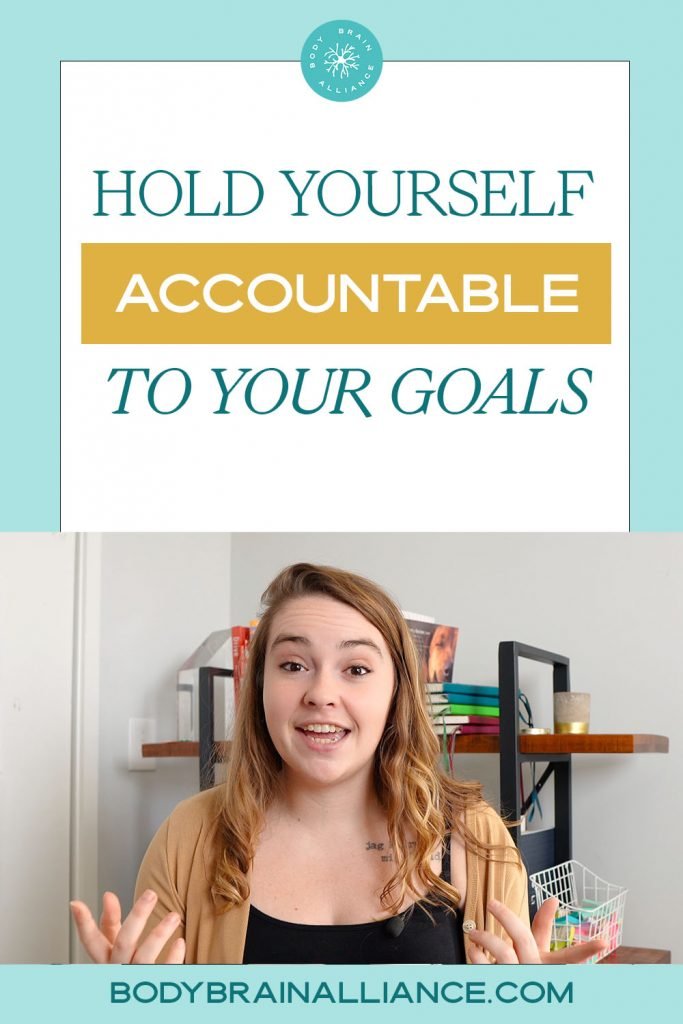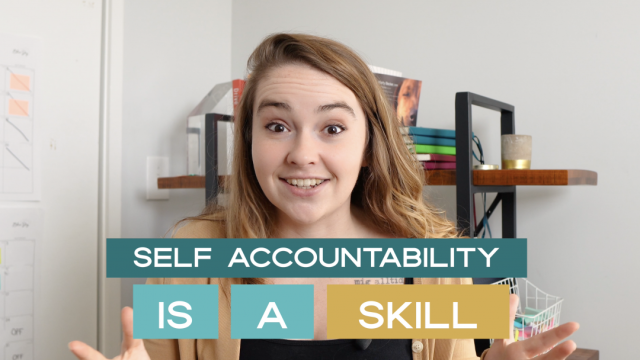Raise your hand if, in your life, there’s a gap.
A gap between what you want to do… and what you actually do.
Yeah, there’s a gap for a lot of us. And that gap–the self-accountability gap–is exactly what I want to talk to you about today. How can you hold yourself accountable to your goals?
I’m a person who has seriously struggled with self-accountability. I cannot tell you the number of projects I have started and abandoned, or goals I have set and let go of, over and over and over again. Throughout most of my life, I have really struggled with this exact concept, but then I went to school for six years, got a Ph.D. focused on healthy behavior change, and learned a lot about the science behind things like self-accountability. That really turned things around for me.
That science is exactly what I bring you today in these 3 tangible tips for how to hold yourself accountable to your goals.
Before we do that, there’s a mindset shift that I want you to make NOW.
Have you ever told yourself, I just need to be more accountable, or I just need to hold myself accountable or I’m deciding right now to hold myself accountable? If you have, leave your answer in the comments so that we all know we’re not alone.
Here’s the problem with that:

Self-accountability is not a decision.
It’s not an action.
it’s not a choice.
Self-accountability. Is. A. SKILL.
That is a really, really important mindset shift to make. It moves your focus from feeling good or bad based on whether you hold yourself accountable to your goals, to growing your self-accountability skills the same way you would grow your guitar-playing skills, or piano-playing skills, or French language skills.
So, you’re probably asking me, Okay, okay, Karin. If self-accountability is a skill like you say it is, how in the world do I practice that skill?
Three ways:
Go on a commitment strike.
What is a commitment strike, you ask?
A commitment strike is when you make as few commitments
to yourself as possible for a period of 7-10 days.
Stop telling yourself you’re going to wake up early. Stop telling yourself you’re going to go to the gym. Yes, literally give up all expectations that you have of yourself.
And here’s the reason for that: I want you to think about your relationship with self-accountability as if it’s your relationship with a friend. If that friend is constantly disappointing you, they’re constantly bailing, they’re constantly not showing up, that kind of hurts. But if you take some time away from that friend, if you give yourself a little bit of distance from those situations, you might be able to build that relationship back up.
The same is true with holding yourself accountable. A lot of times when we are struggling with self-accountability, it’s because we’re actually over-committing. We’re telling ourselves that we’re going to do things that are perfectionistic or unrealistic or don’t actually fit into our daily lives. Giving ourselves a clean slate is the first step to building that self-accountability skill back.
Rebuild your trust foundation with small goals.
Once you’ve spent 7-10 days not promising yourself you’re going to do anything, then you can start to build that trust foundation back up with tiny, tiny tasks. I want you to start with the stuff that you basically know for certain that you’re actually going to do anyways.
So, for example, you might promise yourself, I’m going to get up in the morning tomorrow and drink coffee. If you drink coffee every day, that’s an easy promise to fulfill.
Then you might start with something really tiny like, Tomorrow I’m going to get outside for at least 10 minutes. These tasks should be so small that it would be virtually impossible for you not to follow through on them.
And if there’s a circumstance where you don’t hold yourself accountable, that’s okay. Back up, make the action smaller, and try again.
QUICK TIP
Ask yourself: on a scale from 1-10, how confident am I that I can get this done?
If your answer is not 9+, change that task and make it smaller for yourself.
Over time, this practice will build back that sense of accountability to self. Eventually, you will be able to tell yourself, I need to do a hard thing tomorrow and follow through on it. But we can’t start there. We have to start small and grow our skills. Just like if you are learning piano: you can’t start off by playing Beethoven’s Fifth Symphony. You have to start off by playing Mary Had a Little Lamb and grow from there.
I’m going to pause here for a minute. If you don’t know how to take your goal and break it into tiny steps, I just did a video about that exact topic so that you can go watch that if you need some help.
Let’s move on to tip number three. This one is going to be a little bit harsh, a little bit of a poke. Don’t get too uncomfortable, but you need to…
Confront your lack of follow-through on goals.
A lot of times when we are struggling with holding ourselves accountable, we want to ignore what happened yesterday. We say, Oh, I told myself I’d go to the gym yesterday and I didn’t go, but I’m just going to forget about that and move on and try again today.
The problem is, the best teacher in our lives is our own behavior. We need to study ourselves as diligently as we would study for a test that we absolutely needed to ace.
In those moments where you don’t follow through, in those moments where you promise yourself something and then you don’t actually do it, I want you to get really curious about why that happened.
One of my favorite phrases in behavioral psychology is this:
Every behavior is an attempt to solve a problem.
Your brain is not working against you. As soon as you start figuring out the real reasons why you skipped that workout, or why you ate that thing you don’t want to eat, or why you spent on Amazon instead of saving for your goals… as soon as you figure out the reason why, the real reason why those things are happening, you’ll be able to fulfill those needs in other, healthier ways.
And yes, in this process of reflection, you might feel a little frustrated. You might feel guilty, but the truth is that you can’t run away from those emotions or run away from what happened yesterday if you want to change what’s going to happen tomorrow.
Whew, that got heavy for a second. So I want to finish off with one fun little bonus tip for you. Actually, it’s more of a reminder:
Stay committed to skill development.
You would not expect yourself to become a world-class gymnast overnight, so do not expect yourself to magically become 100% self-accountable just because tomorrow is January 1st (which it’s not, but if it was).
My point here is to have a long-haul mentality. Think about growing this skill over time and holding yourself accountable just 1% more than yesterday. That is going to make the biggest difference.
For more videos like these, check out Body Brain Alliance on YouTube.





